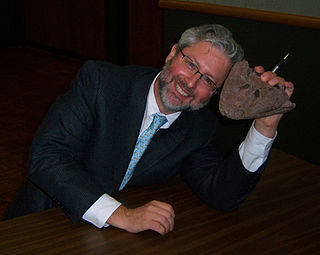A Quote by Bruce H. Lipton
Single cells analyze thousands of stimuli from the microenvironment they inhabit. The more awareness an organism has of its environment, the better its chances for survival. When cells band together they increase their awareness exponentially. Division of labor among the cells in the community offers an additional survival advantage. The efficiency it enables more cells to live on less. Evolution is based on an instructive, cooperative interaction among organisms and their environment enables life forms to survive and evolve in a dynamic world.
Quote Topics
Additional
Advantage
Among
Analyze
Awareness
Band
Based
Better
Cells
Chances
Community
Cooperative
Division
Division Of Labor
Dynamic
Efficiency
Enables
Environment
Evolution
Evolve
Exponentially
Forms
Increase
Inhabit
Interaction
Labor
Less
Life
Life Forms
Live
More
Offers
Organism
Organisms
Single
Survival
Survive
Thousands
To Survive
Together
World
Related Quotes
Most of our brain cells are glial cells, once thought to be mere support cells, but now understood as having a critical role in brain function. Glial cells in the human brain are markedly different from glial cells in other brains, suggesting that they may be important in the evolution of brain function.
In nerve-free multicellular organisms, the relationships of the cells to each other can only be of a chemical nature. In multicellular organisms with nerve systems, the nerve cells only represent cells like any others, but they have extensions suited to the purpose which they serve, namely the nerves.
When the finely tuned balance among the different parts of bodies breaks down, the individual creature can die. A cancerous tumor, for example, is born when one batch of cells no longer cooperates with others. By dividing endlessly, or by failing to die properly, these cells can destroy the necessary balance that makes a living individual person. Cancers break the rules that allow cells to cooperate with one another. Like bullies who break cooperative societies, cancers behave in their own best interest until they kill their larger community, the human body.
Both in Britain and America, huge publicity has been given to stem cells, particularly embryonic stem cells, and the potential they offer. Of course, the study of stem cells is one of the most exciting areas in biology, but I think it is unlikely that embryonic stem cells are likely to be useful in healthcare for a long time.


































